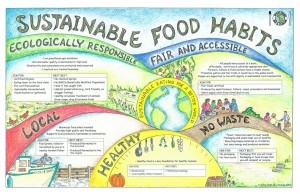Agriculture vs Agribusiness
Note from the NBGP
 In the last article we talked about building a green economy. This article will zero in on one aspect of that economy: agriculture.
In the last article we talked about building a green economy. This article will zero in on one aspect of that economy: agriculture.
Big business and their minions in government have basically replaced the word “agriculture” with “agribusiness”. They always refer to it as “agriculture industry” giving the implication that the raising of crops and animals should have the same processes applied as a manufacturing undertaking. This of course has led to mono cropping and the heavy use of chemical inputs as well as animal confinement facilities where animals have to be fed antibiotics to keep them alive until slaughter.
While trying to think of a word which more accurately describes the Green Party’s vision I came across an article in the latest National Farmers Union(NFU) news letter which seems to fit the bill, “agro-ecology”. The article defines agro-ecology as a holistic approach to farming that uses -and creates- social, cultural, economic and environmental knowledge to promote social justice and long term economic viability as well as healthy agricultural ecosystems.
As our governments continually hand over the control of food and its production to the multinational corporations we see an increase in things like hunger and social unrest, not to mention environmental degradation. As a society moves further away from its source of food it becomes vulnerable to the dictates of those who control the food systems. The Harper government is currently in the process of taking provincial and municipal control over any aspect of self determination and handing it over to the multinationals through the Comprehensive Economic and Trade Agreement (CETA) deal with the European Union. Without going into a lot of detail, this agreement would prevent any level of government from giving preferential treatment to any local entity. Governments could not support “buy local” as it might interfere with the potential profit of the multinationals.
A Green Government would:
(a) Work towards reviving family farms and building food security, or as the NFU article calls it, food sovereignty.
(b) Establish a school food program to provide healthy menus for children and kick-start local food production chains.
(c) Phase in a New Brunswick first food purchasing policy for all provincial institutions.
(d) Support the establishment of food processing enterprises to serve local markets and reform provincial inspection regimes to account for differences between farm-gate, mid-sized, and industrial-scale facilities.
(e) Support mandatory labeling of all genetically engineered foods and food ingredients.
(f) Oppose any trade agreements that would restrict farmers’ rights to save seed.
(g) Phase out the use of genetically modified (GM) seed and ensure that developers of genetically engineered seeds are liable for any contamination of any non-GM crops.
Thirty percent of greenhouse gases come from the agriculture sector so reducing dependence on heavy machinery, synthetic chemicals, and long distance transport is essential. A Green government would establish provincial goals for the reduction of total pesticide and chemical fertilizer use and provide a transition fund to protect farm families income during a three-year transition period to organic production.
Since humans need food to survive, we must decide whether we want to literally put our lives in the hands of a few multinationals whose only concern is the bottom line or many small producers and processors who are concerned not only with making a living, but also with things like biodiversity, healthy soil, and consequently healthy plants, animals and people.
Wayne Sabine
NBGP Carleton-Victoria
Riding Association President
